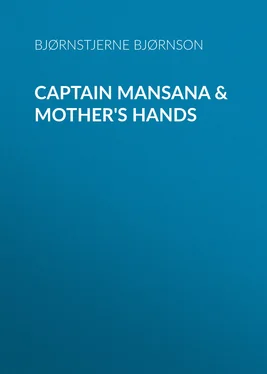Bjørnstjerne Bjørnson - Captain Mansana & Mother's Hands
Здесь есть возможность читать онлайн «Bjørnstjerne Bjørnson - Captain Mansana & Mother's Hands» — ознакомительный отрывок электронной книги совершенно бесплатно, а после прочтения отрывка купить полную версию. В некоторых случаях можно слушать аудио, скачать через торрент в формате fb2 и присутствует краткое содержание. Издательство: Иностранный паблик, Жанр: foreign_prose, foreign_antique, на английском языке. Описание произведения, (предисловие) а так же отзывы посетителей доступны на портале библиотеки ЛибКат.
- Название:Captain Mansana & Mother's Hands
- Автор:
- Издательство:Иностранный паблик
- Жанр:
- Год:неизвестен
- ISBN:нет данных
- Рейтинг книги:4 / 5. Голосов: 1
-
Избранное:Добавить в избранное
- Отзывы:
-
Ваша оценка:
- 80
- 1
- 2
- 3
- 4
- 5
Captain Mansana & Mother's Hands: краткое содержание, описание и аннотация
Предлагаем к чтению аннотацию, описание, краткое содержание или предисловие (зависит от того, что написал сам автор книги «Captain Mansana & Mother's Hands»). Если вы не нашли необходимую информацию о книге — напишите в комментариях, мы постараемся отыскать её.
Captain Mansana & Mother's Hands — читать онлайн ознакомительный отрывок
Ниже представлен текст книги, разбитый по страницам. Система сохранения места последней прочитанной страницы, позволяет с удобством читать онлайн бесплатно книгу «Captain Mansana & Mother's Hands», без необходимости каждый раз заново искать на чём Вы остановились. Поставьте закладку, и сможете в любой момент перейти на страницу, на которой закончили чтение.
Интервал:
Закладка:
Bjørnstjerne Bjørnson
Captain Mansana & Mother's Hands
BIBLIOGRAPHICAL NOTE
[ The two somewhat anomalous stories which are here published together have little in common except the difficulty of finding a place for them in the category of Björnson's works .
" Captain Mansana ," under the title of " Kaptejn Mansana, en Fortælling fra Italien ," was originally printed, in 1875, in the Norwegian periodical " Fra Fjeld og Dal ." It did not appear in book form until August 1879, when it was published, in a paper cover with a startling illustration, in Copenhagen. " Captain Mansana " was written at Aulestad. It was almost immediately published in a Swedish, and later in a German, translation.
A Norwegian magazine, entitled " Nyt Tidsskrift ," was started in Christiania in 1882, and continued to represent extreme liberal views in Norway until 1887, when it ceased to appear. In 1892 an attempt was made to resuscitate this periodical, under the general editorship of J. E. Sars. The first number of this new series appeared in November of that year, the opening article being the story of " Mors hænder " (" Mother's Hands "). It was reprinted in August 1894, in the collection called , " Nye Fortællinger ." It is now for the first time translated into English.
E. G.]CAPTAIN MANSANA
AUTHOR'S PREFACE
The following note was prefixed by the author to the first edition of "Captain Mansana: an Italian Tale":
This story was originally published, several years ago, in a Danish Christmas Annual, "From Hill and Dale," which was edited by Mr. H. J. Greensteen. "Captain Mansana" has already run through two editions in German, and many friends have urged the author to republish it, in a separate form, and in his own tongue.
The following remarks seem necessary in consequence of some criticisms which have appeared in the Danish and Swedish press. The narrative, in all essential particulars, is based on facts, and those of its incidents which appear most extraordinary, are absolutely historical, the minutest details being in some cases reproduced. Mansana himself is drawn from life. The achievements credited to him in these pages, are those he actually performed; and his singular experiences are here correctly described, so far, at least, as they bear upon his psychological development.
The causes which induced me to make him the subject of the following sketch may be found in a few lines of Theresa Leaney's letter, with which the story closes. The reader should compare Theresa's observations on Mansana, with the account of Lassalle, given contemporaneously with the original publication of this story, by Dr. Georg Brandes in his work on the "Nineteenth Century." Any one who studies the masterly portrait painted by Brandes, will observe that the inner forces which shaped Lassalle's destiny are precisely the same as those that swayed Mansana. No doubt Lassalle, with his fertile intellect, his commanding personality, and his inexhaustible energy, touches a far higher level of interest. Still, the phase of character is similar in the two cases, and it struck me at the time as curious, that both Dr. Brandes and myself should have had our attention simultaneously directed to it.
BJÖRNSTJERNE BJÖRNSONCHAPTER I
I was on my way to Rome, and as I entered the train at Bologna, I bought some newspapers to read on my journey. An item of news from the capital, published in one of the Florence journals, immediately arrested my attention. It carried me back thirteen years, and brought to mind a former visit I had paid to Rome, and certain friends with whom I had lived in a little town in the vicinity, at the time when Rome was still under the Papal rule.
The newspaper stated that the remains of the patriot Mansana had been exhumed from the Cemetery of the Malefactors in Rome, at the petition of the inhabitants of his native town, and that in the course of the next few days, they were to be received by the town council and escorted by deputations from various patriotic associations in Rome and the neighbouring cities to A–, Mansana's birthplace. A monument had been prepared there, and a ceremonial reception awaited the remains: the deeds of the martyred hero were at length to receive tardy acknowledgment.
It was in the house of this Mansana that I had lodged thirteen years before; his wife and his younger brother's wife had been my hostesses. Of the two brothers themselves, one was at that time in prison in Rome, the other in exile in Genoa. The newspaper recapitulated the story of the elder Mansana's career. With all, except the latter portion, I was already pretty well acquainted, and for that reason I felt a special desire to accompany the procession, which was to start from the Barberini Palace in Rome the following Sunday, and finish its journey at A–.
On the Sunday, at seven o'clock in the morning of a grey October day, I was at the place of assembly. There was collected a large number of banners, escorted by the delegates, who had been selected by the various associations: six men, as a rule, from each. I took up my position near a banner that bore the legend: "The Fight for the Fatherland," and amongst the group which surrounded it. They were men in red shirts, with a scarf round the body, a cloak over the shoulders, trousers thrust into high boots, and broad-leaved plumed hats. But what faces these were! How instinct with purpose and determination! Look at the well-known portrait of Orsini, the man who threw bombs at Napoleon III.; in him you have the typical Italian cast of countenance often seen in the men who had risen against the tyranny in Church and State, braving the dungeon and the scaffold, and had leagued themselves together in those formidable organisations from which sprang the army that liberated Italy. Louis Napoleon had himself been a member of one of these associations, and he had sworn, like all his comrades, that whatsoever position he might gain, he would use it to further Italy's unity and happiness, or in default that he would forfeit his own life. It was Orsini, his former comrade in the Carbonari, who reminded Napoleon of his oath, after he had become Emperor of the French. And Orsini did it in the manner best calculated to make the Emperor realise the fate which awaited him if he failed to keep his pledge.
The first time I saw Orsini's portrait the idea flashed across my mind that ten thousand such men might conquer the world. And now, as I stood here, I had before me those whom the same feeling for their country's wrongs had animated with the same intense passion. Over that passion a kind of repose had fallen now, but the gloomy and lowering brows showed that it was not the tranquillity of content. The medals on their breasts proved that they had been present at Porta San Pancrazio in 1849 (when Garibaldi, though outnumbered by the French troops, twice forced them to retreat), in 1858, at the Lake of Garda, in 1859 in Sicily and Naples. And it was probable enough, though there were no medals to testify to that fact, that the history of their lives would have revealed their share in the day of Mentana. This is one of those battlefields which is not recognised by the Government, but which has burnt itself most deeply into the hearts of the people, as Louis Napoleon learnt to his cost. He had formally secured the help of Italy against the Germans in 1870; the remembrance of Mentana made it impossible for King and Government to carry out the agreement. It would have been as much as Victor Emmanuel's throne was worth to have done that.
The contrast between this dark and formidable determination of the Italians, and their mocking gaiety and reckless levity, is just as marked as that, between the resolute countenances of the Orsini type, such as I noticed here, and the frivolous faces, which express nothing but a contemptuous superiority or mere indifference.
Читать дальшеИнтервал:
Закладка:
Похожие книги на «Captain Mansana & Mother's Hands»
Представляем Вашему вниманию похожие книги на «Captain Mansana & Mother's Hands» списком для выбора. Мы отобрали схожую по названию и смыслу литературу в надежде предоставить читателям больше вариантов отыскать новые, интересные, ещё непрочитанные произведения.
Обсуждение, отзывы о книге «Captain Mansana & Mother's Hands» и просто собственные мнения читателей. Оставьте ваши комментарии, напишите, что Вы думаете о произведении, его смысле или главных героях. Укажите что конкретно понравилось, а что нет, и почему Вы так считаете.












